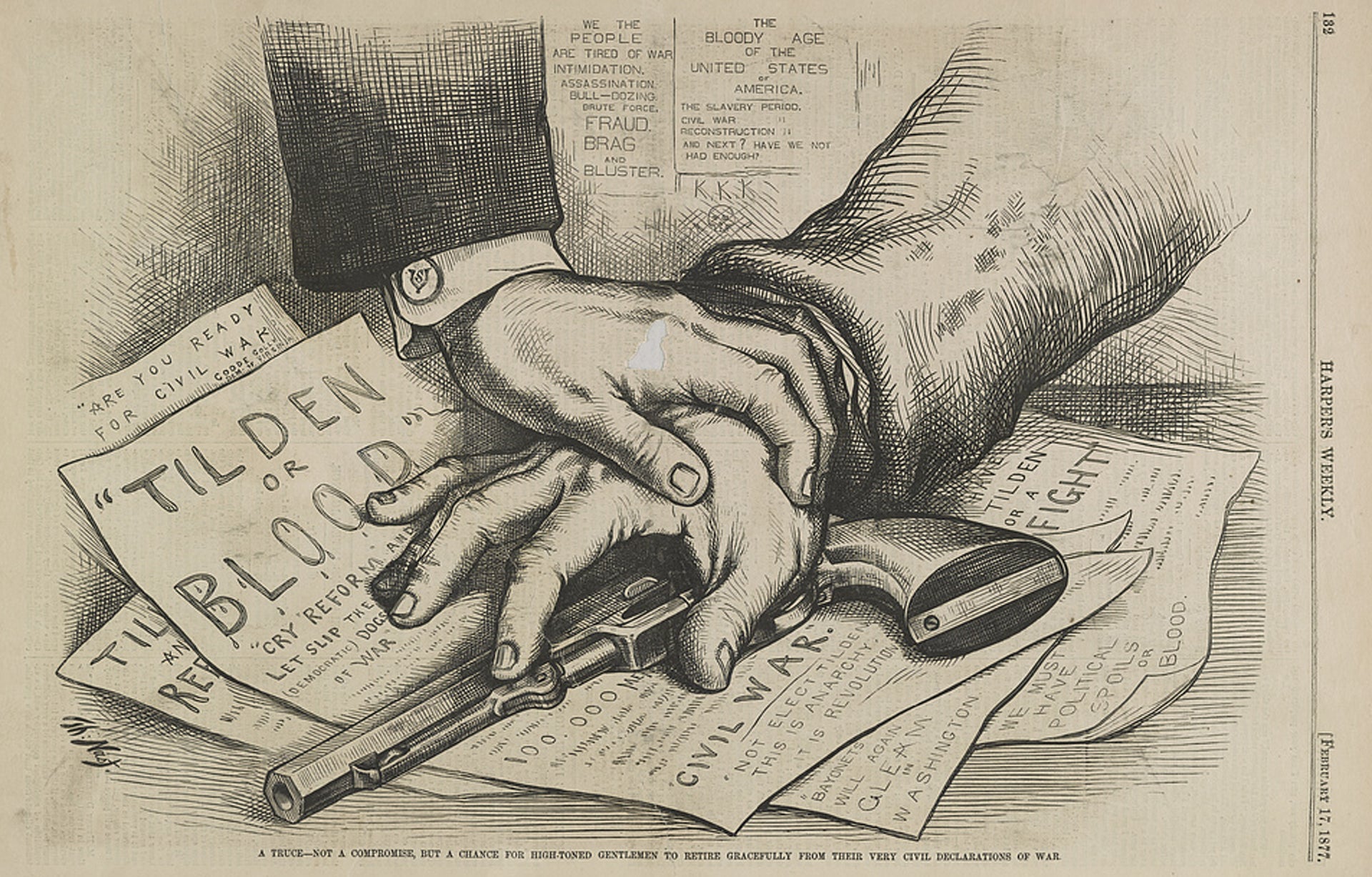"They voted down black rights as equals during the reconstruction period after the Civil war."
Compromise of 1877
The Compromise of 1877 was an informal agreement between southern Democrats and allies of the Republican Rutherford Hayes to settle the result of the 1876 presidential election and marked the end of the Reconstruction era.
Immediately after the presidential election of 1876, it became clear that the outcome of the race hinged largely on disputed returns from Florida, Louisiana and South Carolina–the only three states in the South with Reconstruction-era Republican governments still in power. As a bipartisan congressional commission debated over the outcome early in 1877, allies of the Republican Party candidate Rutherford Hayes met in secret with moderate southern Democrats in order to negotiate acceptance of Hayes’ election. The Democrats agreed not to block Hayes’ victory on the condition that Republicans withdraw all federal troops from the South, thus consolidating Democratic control over the region. As a result of the so-called Compromise of 1877 (or Compromise of 1876), Florida, Louisiana and South Carolina became Democratic once again, effectively bringing an end to the Reconstruction era.
The Compromise of 1877 was an agreement that resolved the disputed 1876 presidential election between Democratic candidate Samuel Tilden and Republican candidate Rutherford B. Hayes. As part of the compromise, Democrats agreed that Hayes would become president in exchange for the withdrawal of...

www.history.com
"The Democrats never wanted slaves to be free. They wanted slavery to continue.The Republicans and Lincoln decided that slavery was un American, and evil."
The republican party is the party of the Corwin Amendment.
The Corwin Amendment is a proposed amendment to the United States Constitution that would shield "domestic institutions" of the states from the federal constitutional amendment process and from abolition or interference by Congress. Although the Corwin Amendment does not explicitly use the word slavery, it was designed specifically to protect slavery from federal power.
The proposed constitutional amendment declared:
No amendment of this Constitution, having for its object any interference within the States with the relations between their citizens and those described in second section of the first article of the Constitution as "all other persons", shall originate with any State that does not recognize that relation within its own limits, or shall be valid without the assent of every one of the States composing the Union.
On February 26, Congressman Thomas Corwin, who had chaired the earlier House committee, introduced his own text as a substitute, but it was not adopted. The following day, after a series of preliminary votes, the House voted 123 to 71 in favor of the original resolution, but as this was below the required two-thirds majority, the measure was not passed. On February 28, however, the House returned to and approved Corwin's version by a vote of 133 to 65, just barely above the two-thirds threshold.
This was Corwins versioon:
"No amendment shall be made to the Constitution which will authorize or give to Congress the power to abolish or interfere, within any State, with the domestic institutions thereof, including that of persons held to labor or service by the laws of said State."
The Senate took up the proposed amendment on March 2, 1861, debating its merits without a recess through the pre-dawn hours on March 4. When the final vote was taken the amendment passed with exactly the needed two-thirds majority – 24-12.
Abraham Lincoln, in his first inaugural address on March 4, said of the Corwin Amendment:
I understand a proposed amendment to the Constitution—which amendment, however, I have not seen—has passed Congress, to the effect that the Federal Government shall never interfere with the domestic institutions of the States, including that of persons held to service ... holding such a provision to now be implied constitutional law, I have no objection to its being made express and irrevocable.
Just weeks prior to the outbreak of the Civil War, Lincoln sent a letter to each state's governor transmitting the proposed amendment, noting that Buchanan had approved it.
The Corwin Amendment has been ratified by:
Kentucky: April 4, 1861
Ohio: May 13, 1861 (rescinded ratification – March 31, 1864)
Rhode Island: May 31, 1861
Maryland: January 10, 1862 (rescinded ratification – April 7, 2014)
Illinois: June 2, 1863
On February 14, 1862, prior to the 1863 ratification of the amendment by the Illinois General Assembly, an Illinois state constitutional convention purported to ratify the Corwin Amendment. However, since Illinois state lawmakers were sitting as delegates to a convention at the time—and not meeting as the actual state legislature—that action was of questionable validity.
The Restored Government of Virginia, consisting mostly of representatives of what would become West Virginia, voted to approve the amendment on February 13, 1862. However, West Virginia did not ratify the amendment after it became a state in 1863.
In 1963, more than a century after the Corwin Amendment was submitted to the state legislatures by the Congress, a joint resolution to ratify it was introduced in the Texas House of Representatives by Dallas Republican Henry Stollenwerck
en.wikipedia.org
Corwin Amendment - Wikipedia
en.wikipedia.org en.wikipedia.org
It would have made slavery constitutional had it been ratified.
Unfortunately for you most black folks know this as I am black and showing it to you. You don't really know much about history.

 www.americanthinker.com
www.americanthinker.com

